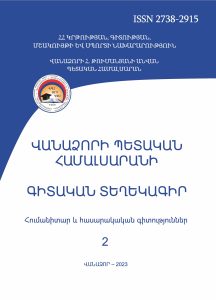Features of Practical Verification of Philosophical Knowledge
Scientific Proceedings of Vanadzor State University Humanitarian and Social Sciences (ISSN 2738-2915)
2023 vol 2
Features of Practical Verification of Philosophical Knowledge
Gnel Tigranyan
Summary

Key words: practice, theory, knowledge, worldview, hypothesis, philosophical knowledge
Systematic knowledge about the reality can have two values: true or false. The criterion of truth and the tool of its verification is practice. It is a person’s material and productive activity, a way to verify ideas and concepts, the foundation and source of knowledge.
After emerging from practical action, knowledge of reality, scientific cognition, reaches the stage of theoretical generalization before returning to practice. Coming back to oneself is not about doing the same things over and over again; rather, it is about gaining fresh insights and understanding. Insofar as philosophy is a general abstract knowledge, it cannot be sufficiently supported by the scientific procedures of known and suggested practical verification. Here, the force of mind verifies and substantiates philosophical conceptions, and practice becomes abstraction.
Practice, however, can also be used as a means of verifying philosophical theoretical frameworks. In specific historical periods, due to practice, a significant part of philosophical theoretical propositions is substantiated. In the process, the worldview thinking develops its ability, segregates true knowledge from delusion in the researched material, arranges the preliminary findings, and establishes the groundwork for additional experimental validation of theoretical knowledge.
